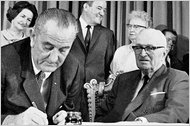The third year of law school is not essential for acquiring the core competence to practice.
« Back to Discussion
The Case Against Law School
Should the standard three years of law school, followed by the bar exam, be the only path to a legal career?
Reduce Credit Requirements
Updated July 21, 2011, 07:56 PM
David Van Zandt is the president of the New School. He served as the dean of Northwestern University School of Law from 1995 to 2010.
The cost of a legal education is driven by two significant factors. The first is demand for the education and the certification it makes possible. The second involves the requirements the American Bar Association imposes on law schools.
Practicing law in the United States almost always requires a juris doctor issued by a law school accredited by the American Bar Association, which allows one to sit for the bar examination in all states. A law license remains valuable because revenue from legal service will continue to grow as national and global economies become more complex and businesses are subjected to greater regulation.
The A.B.A. now requires students to take a minimum of 80 credit hours of coursework to earn the accredited J.D. Until very recently, the association rules also stipulated that the coursework be completed in three separate calendar years. The demand for a J.D. has permitted law schools to raise education fees above the costs incurred to deliver a legal education, resulting in a net increase in law school expense.
The logic behind these policies is not entirely clear, and is a classic case of regulatory capture. The industry itself — in this case the legal education system — controls the regulatory process. Law schools and their faculties have a vested interest in requiring students to spend more time on campus and more money at their schools.
In the last few years, the A.B.A. modified its rules so that students could complete the minimum 80 credit hours within two calendar years instead of three. Northwestern's law school took advantage of that change by introducing an accelerated juris doctor program, in which students can meet the credit hour requirement in two calendar years and a summer term. The cost to the law school remains the same because the credit hours remain the same. Students benefit by saving the opportunity cost of spending a third year in school rather than in paid employment.
The real issue is whether the credit hour requirement can be reduced. I believe that it can. Most lawyers will tell you that although conscientious students can make good use of the third year of law school, it is not essential for acquiring the core competencies of practicing law. Aspiring lawyers would learn far more by spending that last year working in the legal services sector.




 David Van Zandt, president, The New School
David Van Zandt, president, The New School
 Kevin Noble Maillard, law professor, Syracuse University
Kevin Noble Maillard, law professor, Syracuse University
 Rose Cuison Villazor, Hofstra University Law School
Rose Cuison Villazor, Hofstra University Law School
 David Lat, editor, Above the Law
David Lat, editor, Above the Law
 Geoffrey R. Stone, University of Chicago Law School
Geoffrey R. Stone, University of Chicago Law School
 Linda Greene, law professor, University of Wisconsin
Linda Greene, law professor, University of Wisconsin

 Presidents and Their Debts, F.D.R. to Bush
Presidents and Their Debts, F.D.R. to Bush
 Can World Soccer Root Out Corruption?
Can World Soccer Root Out Corruption?
 What Will the Debt Debate Mean for 2012?
What Will the Debt Debate Mean for 2012?
 The Texas Jobs Juggernaut
The Texas Jobs Juggernaut
 Women's Choices: School vs. Children
Women's Choices: School vs. Children
37 Readers' Comments
Post a comment »The first year they scare you to death;
The second year they work you to death;
The third year they bore you to death.
During my career, I spent about 20 years as a "training partner" for young lawyers. It was a tough job, because those kids knew very little of any use when then came out of law school, even though our law firms carefully scrutinized what classes they had taken in law school. My joke is that I've raised 2 children and 6 law clerks. At least half of those law clerks have made me very, very proud, the youngest one eventually becoming president of the bankruptcy bar association in the huge city where he practices. Now that one of my own children is preparing to attend law school, Mom-the-lawyer is no nonsense. My adult child will take all of the important courses, and skip the fluff. He will NOT simply take 80 hours of courses, instead of the 96 I expect of him. In fact, my list of courses he needs to take and master runs longer than 96 course hours. What Mr. Van Zandt misses in his commentary is that in most states, when a young lawyer passes the bar, they are expected to NOT be a danger to clients, in terms of only having a head full of mush and a sheepskin. State Bars expect young lawyers are expected to "know their stuff" in case the "kids" end up immediately representing clients, which is more and more frequently the case as America has built more and more law schools in the last 40 years, and as jobs where young lawyers can be supervised and trained become fewer. The Multistate Bar Exam is woefully inadequate as a test of whether young lawyers know the law of the state where they will be licensed. Similarly, the essay portion of the Bar Exam covers simplistic topics. So woe be unto a poor, innocent client who hires a young lawyer in a state with few if any useful practice treatises, let alone a law student who is lacking 16 hours of courses in topics which could make a life and death difference for a client, whether in terms of incarceration or financial disaster. As a former "training partner", if I had my druthers, law school would be 4 years of 16 credit semesters, with the last year entirely focused on the substantive and procedural law of the state where the student wanted to be licensed. That sounds like the Canadian Bars' procedure they call "articling" which appears to still be favored in Canada. Perhaps Mr. Van Zandt would like to do a research project on the percentage of Canadian lawyers under 10 years of practice who have malpractice claims against them, as compared to the number of malpractice claims against American lawyers under 10 years of practice.
All us non-lawyers should, in my opinion, take a class action suit against all lawyers for collusive price fixing! Why do we need to pay these exorbitant rates to get a job done!
What I'd like to know is why people who actually hire law school grads and/or consume legal services were not consulted. I think they could provide far more important insights on the current system of legal education and its graduates.
In UK, US and some other countries law studies is very close connected with the case law method and is based on studying judical decisions. And this method is connected with the training of the attorneys or legal advisers. And yes man can acquire the same skills at work. And that is why in my opinion there is no difference whether the person gets such knowledge by studying or working.
At the other hand in Europe we have continental systems of law based more on the positive role model (now both models are mixing but it is separate discussion topic). In this system the teaching mehod is based on abstract law institutions. We see our law systems as a logic systems of abstract institutions and every regulation and every judical decision has to fit in this complex system. This method is more difficult from the student perspective because it requires understanding of axiological bases of every law branch. And it requires time. That is why in continental Europe we have 5- year of university courses and after it (it depends of the country) the lawyer must also complete practical course connected with work in the attorney or legal advisor office. Unfortunetely fewer and fewer students are able to manage with this system and they demand shorter courses based on the common law method. And I thonk it makes no good for our law system becouse continental method prepare lawyers to be not only attorneys or legal advisors but also polititians (law- makers), judges, philosophers. They can not only apply the law to the concrete case but also understand the whole legal system.
thomas mcmahon
millis ma
Simple.
Law schools can do a lot better to teach practical lawyering skills such as really listening to clients, problem solving, negotiation, electronic evidence, trial advocacy. The old-school Socratic method is not all that helpful. The "third year" should best be put to teaching some of these real world lawyering skills. A lot more emphasis should be placed in internships and hands on work of lawyering in partnership with practicing attorneys.
Quite frankly, America has become a bizarre system where every sheep pen is guarded by wolves. These wolves talk a good game and tell us all that they are working for the good of society. But they are not, we all know what they eat.
The real question is whether we are willing to do something about it.
The additional $70,000 of debt has also resulted in burdensome student loan payments leaving me with less money to live on then I had when I worked at the mall in college. If I had it to do all over again, I would not have gone to law school unless I received a full scholarship guaranteed for the full number of credits necessary to graduate.
As much as I enjoy the practice of law, the present costs far exceed the benefits.
~ 2009 Law School Graduate
Log In to Post a Comment